Cricket, often described as a gentleman’s game, has played a profound and enduring role in the fabric of Jamaican society. Though the sport’s roots can be traced back to British colonial rule, it has transcended its colonial origins to become a powerful symbol of unity, identity, and resistance within Jamaica. From its influence on the island’s culture and politics to its role in shaping social bonds, cricket remains deeply ingrained in the nation’s collective consciousness.
The Historical Context of Cricket in Jamaica
Cricket was introduced to Jamaica during the British colonial era in the 19th century, as the sport was a popular pastime among British soldiers and settlers. Initially, it was a game reserved for the elite — the British ruling class and wealthy Jamaican landowners. However, by the early 20th century, cricket began to spread to the wider population, becoming a common pastime for people from all backgrounds. By the time Jamaica gained independence in 1962, cricket had evolved into a sport that represented not just leisure, but also a form of national pride and social unity.
During the colonial period, cricket also provided a subtle but powerful way for Jamaicans to resist and challenge the stereotypes imposed upon them by colonial authorities. By excelling at a sport considered “British,” Jamaican cricketers demonstrated their skills, intellect, and discipline, proving that they were equal to, if not better than, their colonial counterparts.
Cricket and National Identity
Cricket has played a crucial role in forging Jamaica’s national identity. Some of Jamaica’s most revered public figures have been cricketers who used their success to inspire a sense of unity and pride. Players like George Headley, Michael Holding, and Courtney Walsh have become household names, not just for their remarkable achievements on the cricket field but also for their representation of Jamaican talent and determination on the global stage.
The success of the West Indies cricket team, which Jamaica is a part of, in the 1970s and 1980s helped to further solidify cricket’s place in Jamaican society. During this period, the West Indies team dominated world cricket, becoming a symbol of black excellence and a source of immense pride for Jamaicans. Cricket victories were not just sporting achievements but also a form of cultural assertion and a demonstration that small nations, once colonized, could stand tall on the world stage.
This sense of pride was reinforced by the way cricket was woven into the rhetoric of national heroes like Marcus Garvey and Bob Marley, who often spoke of sports, especially cricket, as a way to demonstrate Jamaican excellence and self-determination.
Cricket as a Social Unifier
Beyond its political and cultural significance, cricket also serves as a social unifier in Jamaica. The sport is played in nearly every corner of the island, from the rural countryside to urban communities, transcending economic, social, and racial divisions. It is not uncommon to find an impromptu game of cricket being played on the streets, beaches, or local fields, bringing together people from all walks of life.
Cricket has helped foster camaraderie and a sense of community across various social strata. Local clubs and school cricket matches often draw large crowds, with supporters passionately cheering for their teams. At the grassroots level, the sport provides an important outlet for the youth, helping to cultivate discipline, teamwork, and leadership skills, all of which are valuable in their personal and professional lives.
Additionally, cricket has served as a stepping stone for many Jamaican athletes to rise out of difficult economic circumstances. Several Jamaican cricketers have gone on to achieve international fame and success, which in turn has made cricket a symbol of hope and opportunity for many young people on the island.
Cricket’s Influence on Jamaican Culture
The impact of cricket on Jamaican culture extends beyond the sport itself. The language of cricket has permeated everyday conversations, and the island’s vibrant music scene has been influenced by the sport. Reggae, in particular, has seen several songs written about cricket, with artists using the game as a metaphor for life, struggle, and victory. Bob Marley himself was known to be a huge cricket fan, and his music often spoke to the unity and collective pride that the sport fosters.
Moreover, cricket matches in Jamaica are more than just sporting events; they are social gatherings that reflect the spirit of the nation. The atmosphere at Sabina Park in Kingston during an international cricket match is electric, with spectators not only enjoying the game but also celebrating Jamaican culture with music, food, and dance. These events become a fusion of sport and culture, highlighting the integral role cricket plays in Jamaican life.
The Challenges of Modern Cricket in Jamaica
While cricket remains a popular and beloved sport in Jamaica, it faces significant challenges in modern times. The rise of other sports, particularly athletics and football, has overshadowed cricket to some extent, especially as Jamaica has produced world-renowned sprinters like Usain Bolt. Additionally, the structure of domestic cricket has struggled with a lack of funding and facilities, making it harder for younger generations to pursue the sport seriously.
Nevertheless, cricket remains a part of the Jamaican spirit. Efforts are being made to revitalize interest in the game, with investment in youth programs and cricket academies aimed at discovering and nurturing the next generation of Jamaican cricket stars.
Conclusion: A Legacy That Endures
Cricket’s role in Jamaican society is undeniably significant. It is a sport that has transcended its colonial roots to become a symbol of national pride, unity, and cultural expression. From its early days as a pastime for the British elite to its current status as a beloved national sport, cricket has left an indelible mark on Jamaica’s social, cultural, and political landscape.
As Jamaica continues to evolve, cricket remains a vital part of the island’s heritage, serving as a reminder of the nation’s rich history and its ongoing journey toward self-realization and global recognition. Whether through the legends of the past or the promise of future stars, cricket continues to be a source of inspiration, joy, and pride for Jamaicans everywhere.









